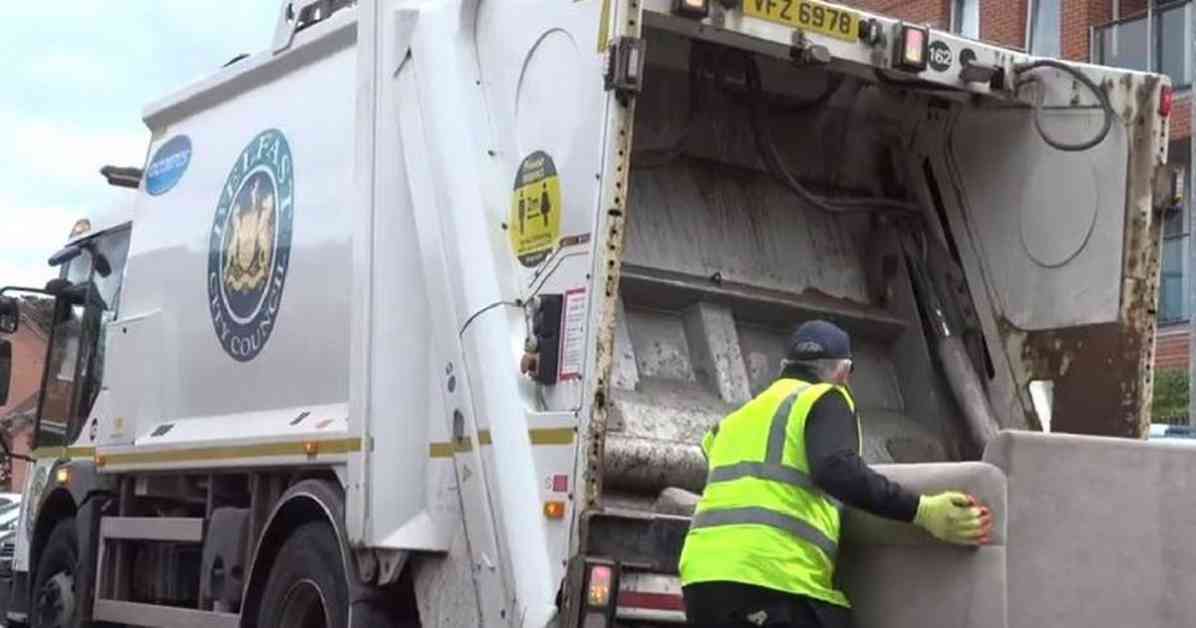The Belfast City Council Criticizes Police for Street Clearance Delays
In a recent development at City Hall in Belfast, the Belfast City Council People and Communities Committee expressed dissatisfaction with the lack of support from the Police Service of Northern Ireland (PSNI) in clearing streets for bin lorries in a pilot program aimed at addressing inconsistent waste disposal issues due to car parking problems. Both council officers and elected representatives raised concerns about the PSNI’s lack of involvement in the initiative designed to make waste disposal more accessible in streets where parked cars obstruct bin lorries.
The pilot project, initiated by the Belfast City Council in collaboration with the PSNI and the Stormont Department for Infrastructure, began in May with the objective of addressing parking obstacles that hinder bin lorries from accessing narrow streets in the city. Areas such as Stranmillis, the Village Area, Loopland, Springfield Road, Lower Ormeau Road, and Iveagh were identified for the pilot program. However, the council officers reported that the PSNI did not provide the expected assistance during the pilot, leading to delays and challenges in the implementation of the initiative.
At the meeting, council officers highlighted the difficulties faced in coordinating efforts with the PSNI and the Department for Infrastructure, particularly in terms of data collection and operational support. While the Department for Infrastructure cooperated with the council in patrolling the designated areas as planned, the PSNI cited operational pressures as the reason for their inability to allocate resources to the pilot project. This lack of support from the police raised concerns among council members about the effectiveness of the initiative and its potential impact on waste disposal in the city.
Sinn Féin Councillor Claire Canavan expressed disappointment with the PSNI’s inability to fulfill their commitments in the pilot program, emphasizing the importance of collaboration between all parties involved. The council acknowledged the challenges faced in collecting relevant data for evaluation and decision-making, urging for more comprehensive support from both the PSNI and the Department for Infrastructure to ensure the success of the initiative.
Rollout of Belfast Council’s New Smaller Lorry Fleet and Glass Collection Expansion
Despite the setbacks faced in the small streets pilot program, the Belfast City Council proceeded with the rollout of a new smaller lorry fleet targeting hard-to-access streets in the city. Two 18-tonne Dennis Eagle refuse collection vehicles were leased for an initial period of 12 months to facilitate waste collection in narrow and congested areas. The introduction of smaller bin vehicles aimed to address the challenges posed by car parking issues and improve waste disposal efficiency in streets with limited access for larger lorries.
While the council did not officially announce the routes for the smaller bin vehicles, Sinn Féin Councillor Micheal Donnelly identified New Barnsley Drive, New Barnsley Crescent, and New Barnsley Gardens in West Belfast as part of the service area for the new vehicles, focusing on black bin collections initially. The phased approach to implementing the smaller bin vehicles included monitoring the routes for capacity and efficiency during the initial phase, followed by route refinement and expansion to include brown and blue bin collections in subsequent phases.
In conjunction with the rollout of the smaller lorry fleet, the council also outlined plans for expanding glass collection services to an additional 22,000 households in 2024/25. The Stormont Department of Agriculture, Environment, and Rural Affairs provided funding support for the expansion, highlighting the importance of sustainable waste management practices in the city. The council aimed to recruit collection crews, procure containers, and communicate the scheme to selected households to ensure the successful implementation of the glass collection initiative.
Challenges and Future Prospects for Waste Disposal in Belfast
The challenges faced by the Belfast City Council in addressing waste disposal issues highlighted the need for enhanced collaboration between key stakeholders, including the PSNI, the Department for Infrastructure, and local communities. The delays and obstacles encountered in the small streets pilot program underscored the complexities of managing waste collection in urban areas with limited access and parking constraints.
Moving forward, the council emphasized the importance of data-driven decision-making and evaluation to assess the effectiveness of waste disposal initiatives and improve service delivery to residents. While the PSNI’s operational pressures posed challenges to the pilot program, efforts to enhance coordination and resource allocation among stakeholders remained critical to achieving sustainable waste management practices in Belfast.
In conclusion, the Belfast City Council’s commitment to addressing waste disposal challenges through innovative initiatives such as the small lorry fleet and glass collection expansion reflected a proactive approach to improving waste management in the city. Despite the setbacks and delays experienced in the pilot program, the council remained focused on enhancing waste collection services and ensuring efficient and sustainable practices for the benefit of residents and the environment. Collaborative efforts and continued engagement with key partners would be essential in overcoming obstacles and achieving long-term success in waste disposal and recycling initiatives in Belfast.




